Tuesday, November 4, 2008
Heart4Haiti2.wordpress.com Publishes Graphic Pictures of Young Haitian Victims by Last Hurricanes
Heart4Haiti2.wordpress is doing a good job exposing the unbelievable conditions of this Caribbean island. Haiti is a place where people go hungry on a daily basis. Children are suffering for lack of food, water, and education. Yet, Haiti is a neighbor to our country, the U.S.A.
Sponsorandfeedachild program sponsors have been willing to help their kids' families rebuild or repair their homes in most situations. So far, 6 children are being helped through this sponsorship program. More sponsors are needed. If you want to sponsor a kid, contact us at sponsorachildemail at gmail.com
Tuesday, October 21, 2008
Six Haitian Children Have Been Sponsored Through SponsorandFeedaChild: Monthly Sponsors' Checks Pay for School and School Supplies
In a country that has the highest illiteracy and child mortality rate in the western hemisphere, any small help counts. That is why we are happy to celebrate our first landmark. Thanks to your generosity and monthly donations, six Haitian children have been sponsored thus far. That means SponsorandFeedaChild has been able to find sponsors for 6 Haitian kids who are able to go to school with the right uniform and supplies.
For those of us who live in Europe, the United States, and Canada, this achievement by a few-months-old program may not mean much, but it means a whole lot for these Haitian children and parents who receive between $20 and $25 monthly for school and school-related expenses. Let us hope that there will be more for them to use on costly food items and health care some day.
How can you join this cause?
There are many ways your agency, your organization, your friends and you can help. The last four hurricanes destroyed schools and limited school supplies. Haitian students are asking for pens, pencils, erasers, glue and other supplies. Some sponsors are sending small boxes of supplies to Haitian students. You too can make your voice heard by organizing a group who will send these materials and supplies to the Caribbean nation of Haiti (I will provide address to you if necessary).
You can decide to contribute only $25 per month to a child whose picture and updated info you will have from time to time. By writing to Sponsorachildemail@gmail.com, you agree to participate in this network-for-good program. You will be right on your way to making the difference in a needy child's life. You agree that education is the best and a guaranteed lifetime investment anyone can make.
Sponsorandfeedachild Program gives you the opportunity to reach out and lift up a needy child. Will you not take this opportunity to do good now?
Once again, thanks to our current sponsors and friends!
http://sponsorandfeedachild.blogspot.com
Monday, October 6, 2008
Food for the Poor, Inc Banana Bark Handcrafted Cards Help Haitian Parents Feed Family
A good friend of mine brought some haitian-handcrafted cards to show me. His daughter loves them so much that she did not want him to give them away. After I read about the organization, I decided to find out more about it by going online. From their field workers, I found current information on the dire situation in Haiti.
These handcrafted cards are made of natural resources, banana barks that are found all over the island. The men and women who make these cards hope customers enjoy their unique beauty and will share them with others. By buying or ordering a packet from them, you will be providing much-needed income for a family living in the poorest country in our hemisphere.
These cards provide income for parents who just want to earn a living to support their families. Bear in mind that most Haitians are desperately poor and earn less than a dollar or two a day. By working on the Banana Bark Program, they are able to get their dignity back and reach some level of self-sufficiency.
Now is the time to order and send banana bark cards.
As for me, I am going to order a few packets of Christmas and all-occasion banana bark cards now.
Go to www.foodforthepoor.org to order your handcrafted cards now
Wednesday, September 17, 2008
Restavek: Haitian Children Exposed to Child Labor, Exploitation and Hard Life in the Aftermath of Hurricane Season
Now, the situation of the Restavek (stay with) is going to be worse. Their guardians lost everything they owned during the hurricanes. They are going to have to take care of themselves. On many occasions, they are left by themselves in the inundated homes they have to clean. Those guardians expect free labor from these kids in exchange of foods, shelter and clothing.
You can help stop this practice by making sure a family is able to care for their own child, let your voice be heard by sponsoring one of these desperate and fragile souls,
Email: sponsorachildemail@gmail.com to get more information about your sponsorship opportunity.
Hurricane Season Highlights Haitian Society And Surfaces Restavek Issues: Understanding Restavek; How To End Children's Exploitation in Haiti
Nobody illustrates that last group better than the restaveks, the thousands of young Haitian children handed over by their poor parents to better-off families, most of whom are struggling themselves.
The term restaveks literally means “stay with,” and that is what the children do with their hosts, working as domestic servants in exchange for a roof over their head, some leftover food and, supposedly, the ability to go to school.
In practice, though, the restaveks are easy prey for exploitation. Human rights advocates say they are beaten, sexually abused and frequently denied access to education, since many host families believe that schooling will only make them less obedient.
Unicef estimates that 300,000 Haitian children were affected by the recent storms, many of them forced to relocate to shelters or rooftops.
But young Haitians suffered significantly even before the skies darkened during Fay, Gustav, Hanna and Ike, and more than 300 lives were lost. The country has the highest mortality rate for children younger than 5 in the Western Hemisphere, as well as a high death rate among infants and women giving birth. Just slightly over half of school-age children are actually enrolled in school. Attendance among restaveks, of course, is much less than that.
“Many of them are treated like animals,” said a United Nations official who spoke on condition of anonymity because she did not have authority to speak on the delicate issue. “They are second-class citizens, little slaves. You feed them a little and they clean your house for nothing.”
Gonaïves, a city in Haiti’s northwest, was no boomtown when the storms hit, having been devastated by a hurricane in 2004, from which it was still recovering. But that did not stop many poor families from taking in restaveks, the offspring of the poorest of the poor.
“Almost everybody has one,” said one of the women jockeying in the relief food line.
They are children like Widna and Widnise, twin 12-year-old girls who have been in the same Gonaïves home for the past two years.
They get up at dawn to fetch water, collect wood, cook, mop and clean. They watch as their host family’s two children, who are about the same age, eat breakfast and then go off to school. The twins eat nothing in the morning and stay home working.
The twins have it better than most, they say. They are hit on their palms if they are disobedient but do not receive lashings on their head, as they say many of the restaveks in nearby homes receive.
In the evening, they eat with the two other children and sleep on mats on the floor, just as those children do. They had shoes, unlike many of their contemporaries, although they lost those in the flooding.
But the girls said they did not like their situation. There is the teasing they get from other children, who tell them over and over that they will never grow up, that they will always be servant girls.
And they miss their mother, who works in the countryside as a domestic servant and visits the girls when she can. She tells them that she will bring them home as soon as she can afford to feed them.
“Our mother is too poor to take care of us,” said Widna, the more talkative of the pair, adding emphatically, “We don’t want to be restaveks.”
What they wanted most immediately on Thursday afternoon was food. Their host family had fled its flood-damaged home, leaving the girls alone. They arrived at a school in the Praville neighborhood where United Nations relief food was being handed out but were told that only women were allowed in line.
The pint-size girls sat off to the side until they noticed that some rice and beans were being dropped amid all the confusion. The girls looked at each other and then sprang into action with some of the other restaveks, scooping up the specks of food from the ground one by one.
Original Source: NYTimes.com
Your Sponsorship Opportunity: Haitian Children Need Sponsors in Times of Needs Caused by Hurricanes, Poverty

Your Unique Opportunity to Sponsor and Lift up a Needy Child
How many needy Haitian children can you sponsor? Just start with one!
Sponsorandfeedachild Program
(http://sponsorandfeedachild.blogspot.com) has a list of needy
children who are waiting for somebody to give them a helping hand.
Maybe all you can afford to sponsor is one child. That is what
Sponsorandfeedachild is all about. It is a tangible way for us,
concerned parents, to reach out and show our own children how we can
help someone else in the world.
The harsh economic and political situation that Haiti has been going
through for the past decades has undoubtedly prevented many parents
from feeding and sending their children to school. I was in Haiti a
few months ago and witnessed the deplorable human conditions! Before the Hurricane season, Haitians had little. Now they have less! Their situations worsened after the recent back-to-back hurricanes that caused mudslides and floodings all over the island.
Some of the parents may resort to placing their kids with more well-off family
members or friends who may be able to raise them. Others who are in a
more desperate situations may end up unknowingly giving up their kids
to "child slavery" where abuse and an uncertain future await them.
As recently reported by ABC News, Child Slavery flourishes where high
illiteracy rates, lack of education and social services exist. As a
poor country, Haiti meets all the conditions for this type of
exploitation to exist. Where else have you heard about parents feeding "mud
cakes or mud cookies" to their hungry children?
Through SponsorandFeedachild Fund, you can make the difference in a
child's life. You can prevent one child from knowing this type of
depravity and misery. Educating and/or feeding a Haitian child will
be greatly appreciated.
If you want to sponsor a child, visit
http://sponsorandfeedachild.blogspot.com or write to us at
sponsorachildemail@gmail.com
More Than 300000 Haitian Children Are Hungry, Shelterless, Affected by Back to Back Hurricanes: Fay, Gustav, Hanna, and Ike
Hurricanes Fay, Gustav and Hanna, which passed through the Caribbean nation in a three-week period, have forced thousands of people to flee to their rooftops. Key bridges have been destroyed and landslides have blocked roads, obstructing aid delivery.
With Haiti having witnessed violent riots in April due to the global food crisis, UNICEF said the current situation has been further exacerbated by possible social and political unrest.
Yesterday, urgently-needed supplies were sent to Gonaives, the hardest-hit city with 70,000 uprooted by the hurricanes, by helicopter and boat. UNICEF and the UN World Food Programme (WFP) have provided drinking water and food, and UNICEF is also providing tarpaulins for shelter, water purification tablets and sanitation materials.
“The initial push to provide aid to Gonaives is a start, but there is a great deal more to be done to help children and families that have been affected by the storms throughout the entire country,” says Nils Kastberg, UNICEF Regional Director for Latin America and the Caribbean.
UNICEF has made more than $1 million available to help hurricane victims, and a Flash Appeal from all UN agencies operating in Haiti will be launched in the coming days.
Neighbouring countries Cuba, the Dominican Republic and Jamaica have also been hit hard by the strong storms, and UNICEF is rushing assistance to those affected while assessing future needs.
“We are faced with a combination, once again, of severe natural disasters in a number of places which is stretching our resources,” Under-Secretary-General for Humanitarian Affairs John Holmes told reporters yesterday.
On 3 September, the UN Office for the Coordination of Humanitarian Affairs (OCHA) deployed a UN disaster and coordination team (UNDAC) to Haiti.
“This is very much the beginning of the operation and we're still trying to establish how bad it is and build up our capacity,” said Mr. Holmes, adding he was ready to assist with assistance from the UN Central Emergency Response Fund (CERF).
The world body's peacekeeping force in Haiti, known as MINUSTAH, is assisting in the aid efforts, including for evacuation and for the distribution of relief items.
“It was really, really difficult even for our troops to assist the population due to the level of the water,” MINUSTAH spokesperson Sophie Boutaud de la Combe told the UN News Centre.
“The situation in Gonaives is really critical and everyone is doing the best they can to support the national authorities,” she added.
So far, MINUSTAH troops have helped to evacuate more than 500 people to emergency shelters, Ms. Boutaud de la Combe said. In addition, hundreds of people have been treated by the Mission's doctors and its helicopters have been transporting food and other emergency relief supplies from the capital, Port-au-Prince, to Gonaives.
On the way back, the same helicopters have been transporting people who require urgent medical attention to the capital because the hospital in Gonaives is not able to treat them, she added.
Friday, September 5, 2008
As Flood Waters Recede, Haitians Are Descending from Rooftops to Find Corpses Burried by Mudslides



Without any doubt, kids will not be able to return to their homes. They are displaced by the series of hurricanes. In many cases, schools are destroyed or under water.
So far, Sponsorandfeedachild Program is helping 5 kids. More children can be helped if you decide to do something today.
If you want to help sponsor a Haitian kid or a family, contact sponsorachildemail@gmail.com
Hurricanes in Photos: Haiti's Children, Schools and Other Infrastructures During the Hurricane Season
Tropical storm Hanna has so far caused the deaths of 90 people in Haiti, 37 of them were killed in Gonaïves, the country's third city. Hundreds of houses have been destroyed and tens of thousands of Haitians have sought safety on rooftops and in temporary shelters.





Floodwaters frustrated efforts by Argentine peacekeepers to distribute food Thursday at orphanages in Gonaives marooned by Tropical Storm Hanna. The peacekeepers hunkered down in their base as people begged for food and water outside.
Half the homes in the low-lying city of 160,000 remain flooded in Hanna's wake, estimated Lt. Sergio Hoj, spokesman for the Argentine battalion, part of a United Nations contingent on the island. Many houses were torn apart. Families huddled on rooftops, overturned cars were everywhere, and televisions floated in the brown water.
At least 137 people died when Hanna struck Haiti, 102 of them in Gonaives and its surroundings, officials said Thursday.
Some 250,000 people are affected in the Gonaives region, including 70,000 in 150 shelters across the city, according to an international official who spoke on condition of anonymity because he was not authorized to release the information.
Forecasters warned Hurricane Ike could hit the Western hemisphere's poorest country next week.
Hanna swirled over Haiti for four days, dumping vast amounts of water, blowing down fruit trees and ruining stores of food as it swamped tin-roofed houses.
Many of the thousands of people who fled to rooftops, balconies and higher ground have gone without food for days, and safe drinking water was in short supply as the fetid carcasses of drowned farm animals bobbed in soupy floodwaters.
Notes: Various sources
Friday, July 4, 2008
Microcreditcapital Promoter Discussed Small Business Idea with Single Mother, but She Needs Funds

Single Mother Is Seeking Sponsors for Her Children. She wants to receive some infusion of cash for a small business. I talked to her about doing something that will bring some income to take care of the kids. Micro enterprises, microlending are the buzz words. They can help her build her microcredit before she can get something big. Definitely, that is a way to get out of poverty.
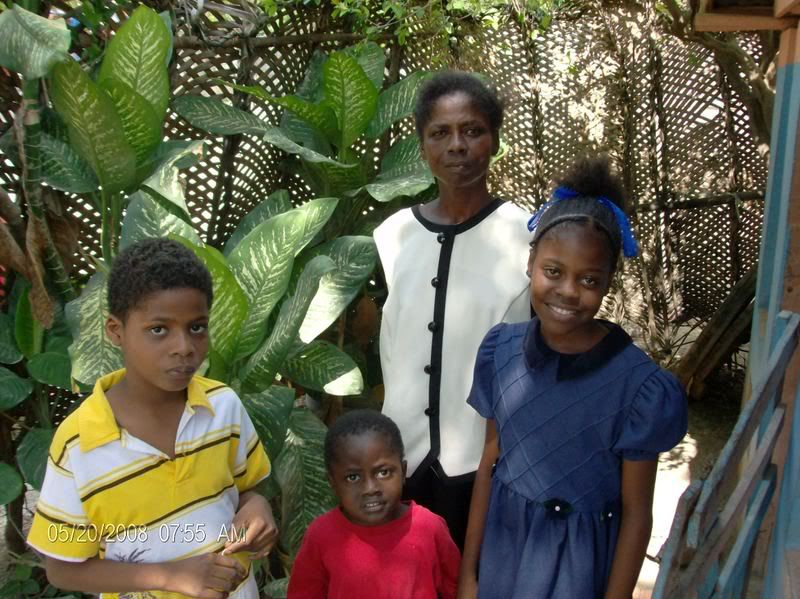
Developmentally Disabled Haitian Boy Left to Himself: No State-funded Services for Him
Luckner has no annual or triennual IEP meeting. He has no advocate. People are busy trying to avoid him instead of making time for him. He felt comfortable being around me while I was there. Others were telling him to go away while I intervened and advocated for him. I explained to them the type of services he could qualify for if he was born in California among other states.
Could there be some type of foundation that provides counseling and information to parents of kids born with clear disabilities? This boy may have been too old by then. But other children born with his condition could benefit from such services in Haiti. Besides the food, nutrition and education problems faced by this family, they have to deal with lack of information on a condition that a state like California entitles parents to receive services for. It's many worlds away. Until now, his mother keeps repeating the fact that her son was born this way because she had seen a disabled kid while she was pregnant with him.

Luckner's parents are also seeking a sponsor for their son. Are you ready to help him out?
List of Haitian Kids in Need: They are Seeking a Sponsor
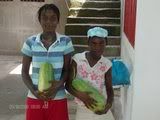
The Laporte Children Need Sponsors
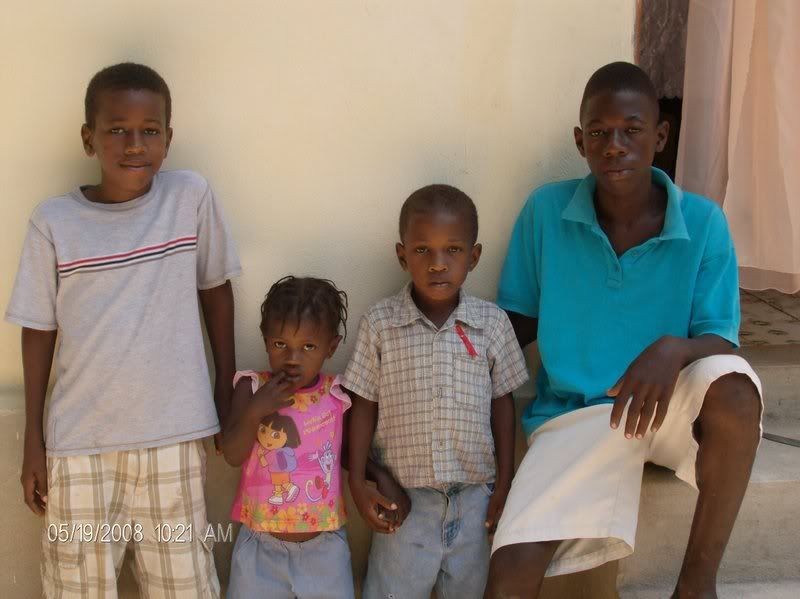
Due to numerous work-related accidents, their father is now bed-ridden. The last time he worked was about 6 years ago. Besides, the hotel where he used to work exists no more. Finding work is almost impossible. It is not easy to find work in this community. Since he is sick, he would not be able to do much any way. His wife manages to do odd jobs to feed and clothe the kids. Yet, despite all the nutrition problems, the kids show their aptitude in school and other extra-curricular activities. JoAnn Laporte, 14 years old, is the older of the girls. She is superb soccer player.
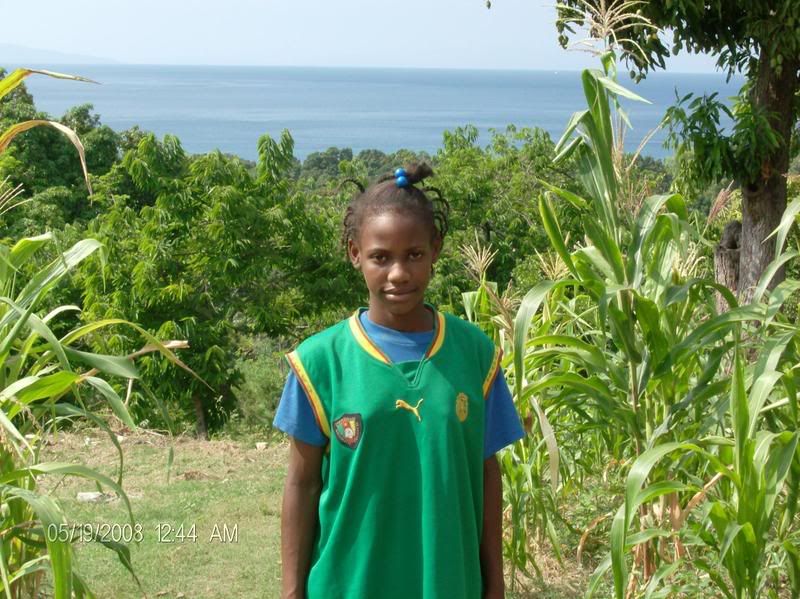
Daniel Laporte is 18 years old. He helps his parents a lot. He needs help to keep attending his school. Buying uniform and school supplies is a yearly challenge. Eating some good meals is also a problem.

Johnyson Laporte is 10 years old. Per his parents, he is a good boy who is very helpful
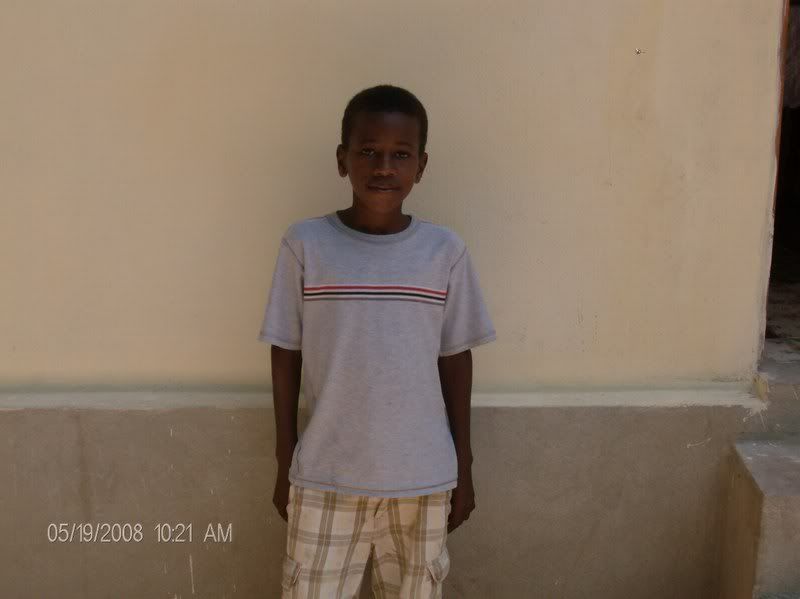
Stephany Laporte is 8 years old.
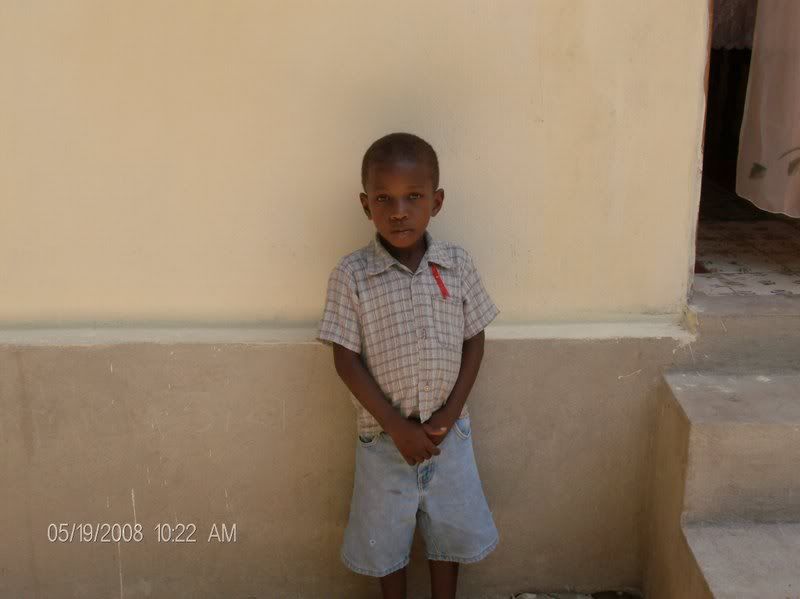
Betina Laporte is 4 years old. She is the first kid to have a sponsor in SponsorandFeedaChild Program history!
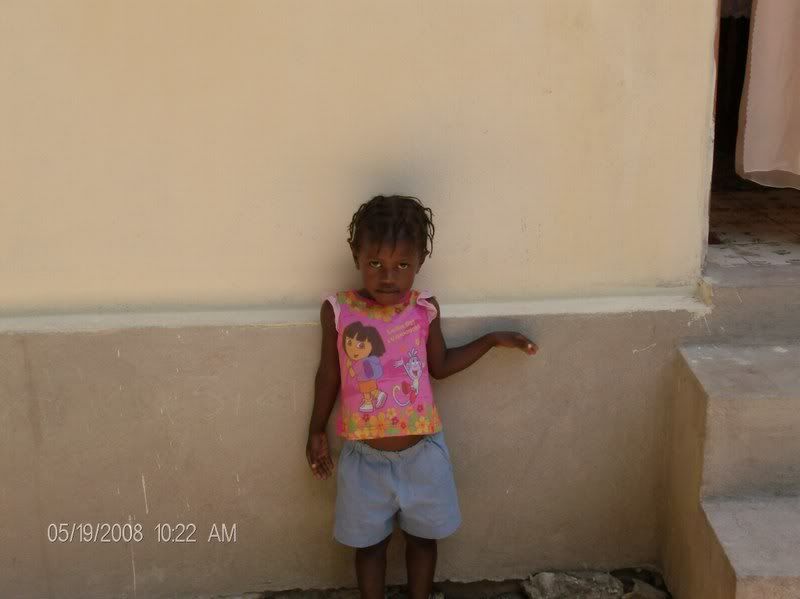
Tuesday, April 22, 2008
Priest Gerard Jean-Juste Is Feeding Kids in Cite Soleil
Other organizations that are working with children in this crisis are:
World Vision International etc.
Haitian Children Are Eating Mud Cookies to Survive; Let's Break the Yoke of Poverty and Hunger




Many women start preparing mud to make mud cookies to feed their family. They dry them in the sun on the the roof of their houses.
Rising prices and food shortages are threatening Haiti's fragile stability, and the mud cookies, made of dirt, salt and vegetable shortening, are one of very few options the poorest people have to stave off hunger.
For the price of a Starbucks, for what you would spend at any fast food restaurant, you could help a child eat a meal and get educated. If teachers are not paid, if they have to worry about what to feed their children, they are not able to teach these young minds.
If you are seeking to help solve the Haitian food crisis, here is your opportunity to do it right here. Your donation will go to a church-based school where teachers can get paid and children can continue to attend classes.
Kids should not be reduced to eat mud, dirt to survive. Check out the food riots in Haiti.















